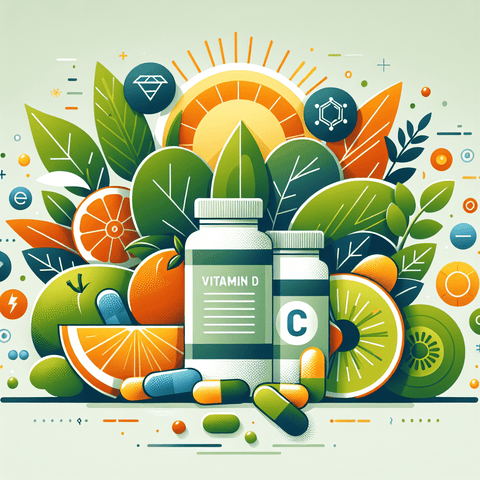Introduction
In today’s fast-paced world, maintaining optimal health is both a priority and a challenge. With busy schedules, processed foods, environmental stressors, and limited time for proper meal planning, many people face nutrient deficiencies that can lead to fatigue, low immunity, and overall diminished well-being. Vitamins—essential micro-nutrients required in small quantities—play critical roles in enabling vital chemical reactions in the body. From supporting energy production and immune defense to bone strength and mental function, these compounds are the building blocks of lasting wellness. Unfortunately, modern dietary choices often fall short in supplying the necessary amounts of these nutrients.
This article aims to guide you in selecting the top three vitamins to incorporate into your daily supplement routine to ensure optimal health, vitality, and disease prevention. While a balanced diet should always be the foundation of any nutritional plan, supplementing with high-quality vitamins can help fill the gaps and amplify the benefits of a healthy lifestyle. Here, we will explore the science behind three powerhouse nutrients—Vitamin D, Vitamin C, and Vitamin B12. These essential vitamins are known to support bone health, immune response, skin integrity, and nervous system function, making them indispensable in your daily regimen.
Let’s dive deeper into the functions of these crucial micronutrients and explore why supplementing them can be a game-changing strategy for enhancing your overall day-to-day wellness.
Essential Nutrients and the Role of Vitamins in Overall Health
Vitamins are organic compounds that our bodies need to operate efficiently. Most vitamins cannot be synthesized endogenously in sufficient quantities and must therefore be obtained through diet or supplements. These substances are categorized into two types: fat-soluble (A, D, E, K) and water-soluble (C and all B vitamins). Each plays a specific and non-redundant role in various biochemical processes, including hormone regulation, tissue regeneration, enzyme function, and antioxidant defense.
Vitamin deficiencies can have a profound impact on health. For instance, low levels of Vitamin D have been associated with bone demineralization, while inadequate Vitamin C intake can lead to poor skin health, reduced immunity, and slow wound healing. Deficiencies in B12, particularly among vegetarians and older adults, can result in fatigue, anemia, or even neurological impairment. Common signs of deficiencies include fatigue, weakened immunity, brittle hair and nails, and cognitive disturbances.
Natural sources of these essential nutrients vary. While fruits, vegetables, and whole grains offer a wide spectrum of vitamins, not everyone consumes the recommended daily servings. Moreover, some food production methods and even cooking techniques can deplete vitamin content in meals. As a result, many individuals choose to bridge nutritional gaps with high-quality supplements, especially for nutrients that are harder to obtain in sufficient quantities through diet alone, such as Vitamin D and B12.
Whether through fortified foods, natural sources, or supplements, ensuring your body has the vitamins it needs is non-negotiable. What follows is an in-depth look into how targeted supplementation can help you achieve vibrant health year-round, especially when dietary limitations come into play.
Nutritional Supplements for Daily Wellness: An Essential Guide
While eating a diverse, balanced diet remains the ideal way to obtain essential nutrients, it is often not enough due to today’s dietary habits and environmental influences. Soil depletion, increased consumption of ultra-processed foods, and lifestyle factors like alcohol intake or chronic stress can deplete vitamin levels faster than they can be replenished. That's where supplements come into play—they can effectively fill in these nutritional gaps to support optimal health and prevent deficiencies before they become symptomatic.
Targeted vitamin supplements contribute to stronger immunity, better cognitive functioning, improved mood, energy levels, and healthier skin. For instance, Vitamin C acts as an antioxidant that neutralizes harmful free radicals, while Vitamin D plays a key role in bone metabolism and immune support. Vitamin B12 is essential for red blood cell formation and DNA synthesis. These vitamins not only serve their primary functions but also interact synergistically with other nutrients in the body to amplify their benefits.
When selecting supplements for daily use, consider factors like bioavailability (how well your body can absorb the nutrient), delivery form (capsules, gummies, sprays, etc.), and certifications of purity and potency. Consulting with a healthcare provider or nutritionist can also help determine which forms and dosages are best for your individual needs. Furthermore, it’s advisable to choose supplements that are low in fillers, artificial additives, and unnecessary binders to minimize the risk of adverse reactions.
Brands that follow stringent quality control protocols ensure transparency and effectiveness of their products. For example, stores like Topvitamine.com offer a curated selection of vitamin supplements that meet high standards of production, safety, and scientific validation. Investing in your health through strategic supplementation is a long-term strategy for enhancing resilience and achieving balance in a demanding world.
Daily Health Boosters: The Top Three Vitamins to Incorporate into Your Routine
Among the array of vitamins available, some hold more significance than others due to widespread deficiencies and their broad impact on key bodily systems. Based on scientific research and population health trends, three vitamins stand out as most beneficial when taken daily: Vitamin D, Vitamin C, and Vitamin B12. These nutrients are foundational in supporting the skeletal, immune, nervous, and cardiovascular systems, among others.
These vitamins are often under-consumed or poorly absorbed, particularly in certain populations such as vegetarians, the elderly, and individuals with limited sun exposure or gastrointestinal conditions. By consistently integrating these into your routine—either through nutrient-rich foods or high-quality supplements—you can enhance energy levels, resilience to infections, cognitive sharpness, and overall wellness. Let’s examine each of these superstar vitamins in detail.
Vitamin D: The Sunshine Vitamin – Your Essential Micronutrient for Bone and Immune Health
Vitamin D, a fat-soluble nutrient known as the "sunshine vitamin," plays a crucial role in calcium absorption and bone metabolism. It exists in two main forms: D2 (ergocalciferol) and D3 (cholecalciferol), with D3 being the more effective form in raising and maintaining adequate vitamin D levels in the blood. The body can synthesize D3 when exposed to sunlight, yet factors like geographical location, skin pigmentation, seasonality, and the use of sunscreen significantly affect endogenous production. Consequently, many people do not meet the recommended intake levels purely from sun exposure and diet.
Vitamin D is vital for bone mineralization and helps in maintaining muscular function and balance, which reduces the risk of falls and fractures, particularly in the elderly. It also plays a multifaceted role in modulating the immune system and may help protect against respiratory infections and autoimmune conditions. Moreover, emerging evidence suggests associations between adequate Vitamin D and improved mood as it acts on brain areas responsible for producing serotonin—a key neurotransmitter that influences mood, appetite, and sleep.
Dietary sources include fatty fish like salmon and mackerel, egg yolks, and fortified products such as cereals and dairy alternatives. However, concentrated sources through supplementation are often necessary to correct or prevent deficiency. Daily dosages generally range from 800 to 2000 IU, though individual needs may vary and should be assessed via blood tests. To explore scientifically-formulated vitamin D products, check out the assortment on Topvitamine.com.
Ensuring optimal Vitamin D levels can yield numerous benefits, from stronger bones and improved immunity to brighter mood and mental clarity—solidifying its place as a non-negotiable element of your daily supplement strategy.
Vitamin C: The Ultimate Nutritional Optimization for Immunity and Antioxidant Support
Vitamin C, or ascorbic acid, is a potent antioxidant and water-soluble vitamin essential for the growth and repair of tissues—all while playing a fundamental role in immune defense. As the body cannot produce or store Vitamin C, consistent daily intake via food or supplements is indispensable. This nutrient contributes significantly to the production of collagen—a protein needed for healthy skin, vessels, and connective tissues. It also enhances the absorption of iron from plant-based sources, making it especially important for those at risk of iron deficiency.
One of the most well-known functions of Vitamin C is its role in reducing the oxidative stress inflicted by free radicals, thereby aiding in the prevention of cellular damage. It contributes to safeguarding the immune system by supporting the function of various immune cells and enhancing their ability to protect against pathogens. Furthermore, studies suggest that optimal levels of Vitamin C can lead to faster wound healing and reduced inflammation, while also mitigating the severity and duration of common cold symptoms.
Fruits and vegetables like oranges, strawberries, kiwi, red bell peppers, and broccoli are excellent sources of Vitamin C. Despite its availability, many people fall short of the recommended daily intake of 75–90 mg. Supplementation, particularly during illness or periods of high stress, is often necessary for achieving therapeutic levels. Buffered forms of Vitamin C or extended-release capsules are gentler on the stomach and more effective over time.
To maintain robust immunity and youthful skin, consistent Vitamin C supplementation is key. Visit Topvitamine.com for top-quality options that meet the highest standards for efficacy and absorption.
Vitamin B12: A Vital Nutrient for Energy Production and Nervous System Function
Vitamin B12, also known as cobalamin, is a water-soluble vitamin integral to many bodily functions, including DNA synthesis, red blood cell formation, and neurological function. It plays a pivotal role in the metabolism of every cell by converting food into usable energy, which is particularly important for those struggling with chronic fatigue or poor energy levels. The nervous system, in particular, relies on B12 for the formation and maintenance of the myelin sheath—a fatty layer protecting nerve fibers.
B12 deficiency is surprisingly common, particularly among vegans, vegetarians, individuals with gastrointestinal disorders, and older adults due to decreased absorption efficiency. Symptoms of deficiency range from weakness, anemia, and memory problems to mood disturbances and even irreversible nerve damage if left unchecked. Regular supplementation is especially crucial for those at risk, with recommended daily doses typically around 2.4 mcg for adults but often higher for therapeutic purposes.
The best dietary sources of Vitamin B12 include meat, fish, eggs, and dairy products. For those with dietary restrictions or absorption issues, sublingual tablets, oral capsules, or even B12 sprays and injections are popular and well-absorbed options. Choosing a methylated form of B12—methylcobalamin—can offer superior absorption and metabolic functionality.
For those looking to boost vitality, support cognitive function, and maintain energy metabolism, daily intake of B12 can make a profound difference. For a wide range of B12 formulations tailored to different health needs, browse the selection available at Topvitamine.com.
Integrating These Vitamins into Your Daily Nutritional Optimization Plan
Successfully incorporating these essential vitamins—D, C, and B12—into your daily regimen requires thoughtful planning and consistency. Begin by identifying your specific needs through a health assessment or lab tests. From there, choose high-quality supplements that offer bioavailable forms in appropriate dosages. The time of day you consume vitamins can also influence absorption: fat-soluble vitamins like D should be taken with meals containing healthy fats, while water-soluble ones like B12 and C can be taken with or without food, preferably in the morning or early day to avoid potential interference with sleep.
Pairing your supplements with a nutrient-dense diet enhances efficacy. A good multivitamin can serve as a foundation, but focused supplementation allows you to target areas requiring additional support. For example, individuals with limited sun exposure or darker skin tones may need consistent Vitamin D3 supplementation, while those following plant-based diets should prioritize Vitamin B12.
When food sources fall short—or when physiological needs are elevated, such as during pregnancy, illness, or aging—supplements become indispensable. Monitoring your response to supplementation and adjusting dosages with professional guidance ensures long-term benefits without the risk of toxicity or nutrient imbalances.
Quality matters: stick to trusted retailers like Topvitamine.com, where you can find vitamins that are responsibly sourced, independently tested, and compliant with European health safety regulations.
Final Recommendations and Tips for Daily Vitamin Intake Success
Incorporating the right vitamins into your lifestyle is a long-term investment in health. However, supplementation should be approached thoughtfully and in conjunction with holistic practices like regular physical activity, balanced nutrition, stress management, and adequate sleep. Speak with a healthcare provider before starting any new supplements, especially if you are on medication or managing a chronic condition—this ensures both safety and synergy among treatments.
A common concern with supplementation is the risk of overdoing it. While water-soluble vitamins rarely lead to toxicity, fat-soluble ones like Vitamin D can accumulate in the body, so it’s important not to exceed the tolerable upper intake levels. Stay informed about your nutrient intake, read product labels carefully, and keep track of how your body feels in response to changes.
Making vitamin intake a habit is equally important. Setting daily reminders or integrating supplements into your morning or evening routine can help you stay consistent. Using a pill organizer or subscribing to monthly delivery services from trusted retailers like Topvitamine.com simplifies the process and ensures uninterrupted access to your essential health boosters.
Conclusion
In summary, optimizing your health begins with mindful nutrition. Vitamins are fundamental to nearly every physiological function, and ensuring adequate intake—especially of Vitamin D, Vitamin C, and Vitamin B12—can significantly enhance your energy, immunity, mental clarity, and overall resilience. These three nutrients are not just essential; they’re highly impactful and often under-consumed due to dietary limitations, lifestyle habits, and individual health conditions.
By understanding the vital roles these vitamins play and adopting a daily supplementation strategy, you empower yourself with the tools needed to thrive in a demanding modern world. Make informed decisions, prioritize quality sources, and commit to consistency, and you’ll build a strong foundation for lifelong wellness.
Q&A Section
Q: Why are Vitamin D, C, and B12 considered the top three essential vitamins?
A: These vitamins are among the most crucial due to their widespread deficiencies and their pivotal roles in immune health, energy production, bone strength, and cognitive function.
Q: Can I rely on food alone for these vitamins?
A: While food should be your primary source, modern diets often fall short. Supplementation helps fill in gaps, especially for Vitamin D and B12, which are harder to obtain consistently through diet alone.
Q: Is there a risk of taking too many vitamins?
A: Yes. While water-soluble vitamins like C and B12 pose minimal risk, fat-soluble vitamins like D can accumulate in the body. Stay within recommended dosages and consult your healthcare provider.
Q: What’s the best time to take these supplements?
A: Vitamin D should be taken with meals containing fat. Vitamin C and B12 are best in the morning and can be taken with or without food.
Important Keywords
Top vitamins to take daily, best daily vitamins, Vitamin D supplement, Vitamin C immunity supplement, Vitamin B12 energy support, immune boosting vitamins, daily wellness supplements, vitamins for fatigue, bone health support, natural vitamin sources, Topvitamine supplements, high-quality vitamins, trusted supplement brands, nutritional optimization, vitamins for energy and immunity.



